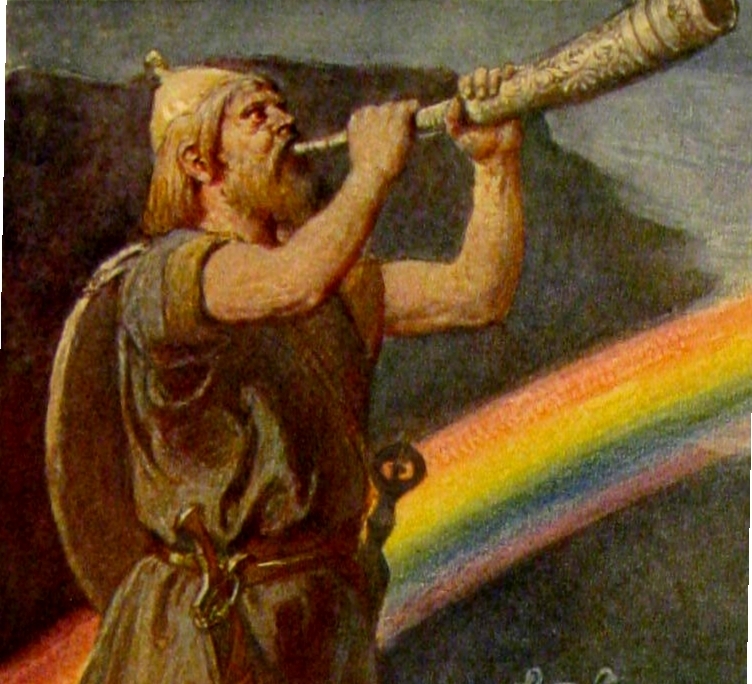Heimdall, also known as Heimdallr, is a figure in Norse mythology and considered to be one of the Æsir gods. He is known as the watchman of the gods and is responsible for guarding Bifröst, the rainbow bridge that connects Asgard, the realm of the gods, to Midgard, the realm of humans. Heimdall is often depicted with keen senses, including sharp eyesight and hearing, and is said to be able to see for hundreds of miles and hear the grass growing.
In the Prose Edda, written by Snorri Sturluson in the 13th century, Heimdall is described as having nine mothers who were all sisters. He was raised in secrecy on the edge of the world by these women and was gifted with extraordinary powers as a result. In addition to his keen senses, Heimdall was also a skilled warrior and carried a horn named Gjallarhorn, which he used to sound an alarm in times of danger.
Heimdall plays a significant role in the Norse myth of Ragnarok, the end of the world. In the poem Völuspá, which is part of the Poetic Edda, Heimdall is described as the first of the gods to see the coming of Ragnarok. He sounds his horn, Gjallarhorn, to warn the other gods of the impending doom. Heimdall is also said to have fought fiercely in the final battle against the giants and was ultimately killed in combat.
In the Skáldskaparmál section of the Prose Edda, Heimdall is referred to as "the white god" and "the hallower of the gods." He is also described as having golden teeth, which were said to have been given to him as a gift by the god Mimir. Heimdall's keen senses are emphasized in this section, with the poet describing how he can hear the wool growing on the backs of sheep.
Another important reference to Heimdall can be found in the Lokasenna, a poem in the Poetic Edda. In this poem, Loki insults the other gods and accuses them of various misdeeds. Heimdall, who is also present, defends the gods and challenges Loki to a fight. While the fight does not take place in the poem, Heimdall's bravery and loyalty to the gods is clearly demonstrated.
In conclusion, Heimdall is a key figure in Norse mythology known for his extraordinary senses and his role as the watchman of the gods. He appears in several important myths and poems, including the Prose Edda, Poetic Edda, and Lokasenna, and is particularly notable for his role in the myth of Ragnarok.
Heimdall in Norse mythology:
-
In the Poetic Edda, the poem "Rigsthula" tells of Heimdall's journey to earth as a disguised man to father the three classes of society: thralls, freemen, and nobles.
-
In the Poetic Edda, the poem "Voluspa" describes Heimdall as the son of nine maidens and the watchman of the gods, who will blow the Gjallarhorn to signal the beginning of Ragnarok.
-
In the Poetic Edda, the poem "Grimnismal" describes Heimdall's hall, Himinbjorg, which is located at the edge of the world and guarded by Heimdall himself.
-
In the Poetic Edda, the poem "Lokasenna" includes a heated exchange between Heimdall and Loki, in which Heimdall accuses Loki of being a liar and a murderer.
-
In the Prose Edda, Heimdall is said to have nine mothers, all of whom are sisters, and to have been born at the end of the world.
-
In the Prose Edda, Heimdall is described as being the tallest and most handsome of the gods, with gold teeth and a shining horn.
-
In the Prose Edda, Heimdall is said to have invented the runic alphabet and to have been the teacher of mankind.
-
In the Prose Edda, Heimdall is said to have engaged in a fierce battle with Loki during Ragnarok, in which they both die.
-
In the Gesta Danorum, a medieval Danish chronicle, Heimdall is identified with the legendary Danish king Hadding, who fights against giants and demons.
References:
-
"Rigsthula." The Poetic Edda, edited and translated by Carolyne Larrington, Oxford University Press, 2014, pp. 39-47.
-
"Voluspa." The Poetic Edda, edited and translated by Carolyne Larrington, Oxford University Press, 2014, pp. 1-19.
-
"Grimnismal." The Poetic Edda, edited and translated by Carolyne Larrington, Oxford University Press, 2014, pp. 49-55.
-
"Lokasenna." The Poetic Edda, edited and translated by Carolyne Larrington, Oxford University Press, 2014, pp. 123-131.
-
Snorri Sturluson. The Prose Edda, translated by Jesse L. Byock, Penguin Classics, 2006.
-
Saxo Grammaticus. Gesta Danorum, edited and translated by Karsten Friis-Jensen and Peter Fisher, Oxford University Press, 2015.


